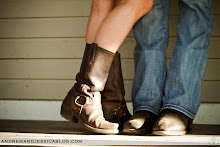In exactly four weeks, I will have loaded up the Subaru with the last pieces of my life left in Atlanta, driven 1,400 miles, and arrived to my new life in Denver, Colorado. I'm definitely ready to be in the same city again as Adam. Six months away from him has been seriously hard!
Adam and I lucked out finding a house to rent at a ridiculously affordable price in a pretty cool area of Denver called Washington Park (or, as the locals say, Wash Park). The house is wicked spacious with a huge deck and an equally large backyard with lots of possibilities. One of the possibilities I want to jump on is starting up some gardening again. This presents a new challenge of learning for me since I've never lived in this kind of climate/altitude before and I need to learn about the growing conditions and vegetation unique to Denver. In addition, I'll probably do container gardening since the house and it's backyard, don't technically belong to Adam and me and I don't want to cause any issues with the landlord by converting the backyard into my own personal Garden of Eden. I came across an interesting gardening system called Earthbox after watching a youtube video of one of my favorite chefs, Rick Bayless being interviewed. The boxes seem to get pretty good reviews but I would love to hear if any of you have used an Earthbox!
The change of scenery will also present a new twist on what goes down in the kitchen. I've been reading some about cooking/baking and know my boiling point will be affected due to the change in atmospheric pressure which will in turn affect, among many things, my cooking time. One way I have really enjoyed cooking is braising and I'm not sure the specifics on how this change to a higher altitude will affect this kind of cooking. Obviously, I understand the cooking time will be longer and I'm guessing I may need to start off with more liquid then the original recipe calls for, but I came across a good point made on a website related to high-altitude cooking and it got the wheels in my brain turning a bit. The comment was this:
Charts giving the boiling point of water vs altitude are based on the standard atmosphere and can be quite misleading. If the barometric pressure is different from the standard atmosphere, the actual boiling point of water will vary from that given in the charts.
For example: If you live in Denver and wish to calibrate your thermometer using boiling water as the standard, the charts will tell you the boiling point of water in Denver is 202°F. If on that day the barometric pressure in Denver is 30.05 inHg, the correct boiling point for water is 212+°F. If your thermometer indicates 212° in boiling water, you will believe it to be 10° high. This means that if you are cooking a chicken to an internal temperature of 170°F in the breast, you will actually overcook by 10°, scratch your head, and wonder why is was dry when you did everything right.
A more reliable way to determine the correct boiling point of water, at a specific time, is to use the calculator below. Just enter the current barometric pressure, in inches of mercury (inHg), and click on "Do Boiling Point Calculation". The correct boiling will be returned in the lower window.
For example: If you live in Denver and wish to calibrate your thermometer using boiling water as the standard, the charts will tell you the boiling point of water in Denver is 202°F. If on that day the barometric pressure in Denver is 30.05 inHg, the correct boiling point for water is 212+°F. If your thermometer indicates 212° in boiling water, you will believe it to be 10° high. This means that if you are cooking a chicken to an internal temperature of 170°F in the breast, you will actually overcook by 10°, scratch your head, and wonder why is was dry when you did everything right.
A more reliable way to determine the correct boiling point of water, at a specific time, is to use the calculator below. Just enter the current barometric pressure, in inches of mercury (inHg), and click on "Do Boiling Point Calculation". The correct boiling will be returned in the lower window.
Now I'm wondering if I need to be checking the barometric pressure before cooking something, like a chicken, in order to properly adjust for the correct internal temperature needed so my food is still edible. (Yeah, I know. Probably a nerdy thing to do but this is my analytical side coming out of me! Thanks, Dad.) Anyone have any suggestions and/or advice? I would seriously appreciate the tips! :)

